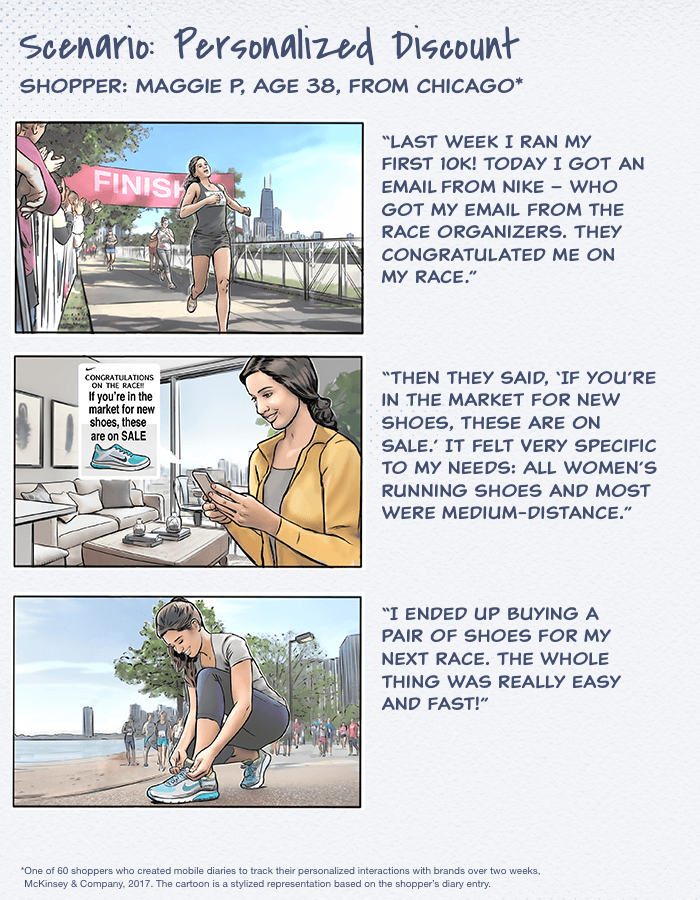As we know, personalized marketing is a big deal. Thus, personalized marketing’s future looks engaging [pun intended 🙂 ]. Let’s see why. And offer several tips.
Background on Personalized Marketing
So, how should we define personalized marketing? Consider these observations from three prior posts:
- One of the toughest issues for marketers is how much to personalize. On the one hand, firms need as much customer data as possible to target individual shoppers. On the other hand, many customers want their privacy. And they do not appreciate it when they are overly tracked. [1]
- In today’s high-tech marketing environment, personalization is a major competitive advantage. Thus, personalization can involve products such as the NikeiD footwear line as well one-to-one communications. As Conversant Media puts it: “Virtually everyone agrees a personalized message tailored to an individual’s wants and needs is more apt to drive a sale than a general one.” [2]
- Neustar (a data-intelligence firm) published a report on personalized marketing. “Customers expect it. And technology enables it. As a result, brands that deliver it generate huge increases in ROI. Personalization goes beyond adding a customer’s name to communication. Customers expect relevant content in the right channel at the right time. Whether on a brand’s Web site, a social network, or an E-mail inbox. For brands, delivering one-to-one experience at scale requires leveraging complex data sets, processes, and platforms.” [3]
Personalized Marketing’s Future Looks Engaging
Consulting giant McKinsey & Co. produces excellent FREE material. And it covers diverse topics. Recently, it published this article. “What Shoppers Really Want from Personalized Marketing.” In that article, McKinsey notes:
“Gotten an unsolicited and irrelevant offer on something you’ve done online? Know the creepy feeling that ‘someone is watching me’? This reaction is the third rail of the drive to personalize interactions with customers. And that’s a problem because, if done right, personalization can be a huge hit. Targeted communications that are relevant and useful create lasting customer loyalty and drive revenue growth. The challenge: To personalize in a way that doesn’t cross lines and delivers genuine value and relevance. But how do you know?”
Click the image to access the article.
Personalized Marketing Tips
According to McKinsey, what do consumers value most?
1. “Give me relevant recommendations I wouldn’t have thought of myself. Shoppers don’t want constant reminders of products they’ve already bought or searched for. Especially if the ads appear either too soon, too often, or too late in the process.” Instead, personalize products. The figure shows a McKinsey example of this.
2. “Talk to me when I’m in shopping mode. Previous order data can provide useful cues about activities. Such as ordering a gift for someone’s birthday or anniversary.”
3. “Remind me of things I want to know but might not track. So, help shoppers track specific events. Such as when someone may be running out of an item bought earlier. When a desired item is back in stock or on sale. Or when a new style is launched for a product or category the shopper has often bought.”
4. “Know me no matter where I interact with you. Thus, communications that seamlessly straddle online and offline experiences make a customer feel a firm really knows them.” And the figure shows a McKinsey example of this.
5. “Share the value in a way that’s meaningful to me. For instance, loyalty programs and purchase data are useful. (a) By telling firms the products an individual customer buys. (b) By seeing how often he or she buys. (c) Be learning when they buy. (d) And by knowing what product categories they never buy. Thus, personalizing (‘gamifying’) the experience leads to purchases and new buying behavior.”




This article really presents many good ideas about the personalized marketing, and I think it interesting and helpful for us to shopping in the future. The personalizing experience gives us lots of convenience and save many time and money when we decide to buy something. During the personalized marketing that consumer could find what they most valuable and exciting shopping experience.
Personalized marketing is the future for business. It doesn’t matter how well you market a pink dress to me, I still will not buy because that item does not pertain to me. While shopping online most stores track your interests and reflect them in your next advertisement. For example, the majority of my advertisements are for car parts. It is a step in the right direction but at some point they algorithm that picks up on your shopping habits should learn your personal details. Those ads know that I like cars and spend money on car parts, but what if they knew what kind of car I have and what parts to display that pertain to my make and model. That, I believe, is the next step.
I am the type of person that doesn’t really like shopping, but will go onto websites and save things in carts/wish lists, but will never buy (usually because I know I don’t need it, can’t afford it, etc). I find it quite annoying when the ads all over my Facebook feed are then flooded with these products, which is especially disheartening if the reason for not buying them is because I cannot afford them.
This article really encompasses how a consumer wants to be treated by online marketers. I must say that I have fallen for internet ads in my browser about products I have previously viewed. It is as though my computer knows I am interested in that specific product and is tempting me to buy it. But I agree with this article in that in can be a bit “creepy” when this happens, as though you are being watched. I also do not enjoy this feeling, which is why I feel so strongly that personalized marketing can be much more successful when done correctly. Getting advertisements when I’m in a shopping mood is crucial, as it is annoying to be studying on Quizlet and become distracted by ads of websites I’ve recently viewed. Loyalty programs, as mentioned in the article, are also very important. They definitely propose a strong marketing incentive for me to buy.
One of the major takeaways from this post is how important timing is when marketers are attempting to reach consumers. Consumers should be in “the shopping mood”, so I agree with the method outlined in the Shoedazzle example: when the customer was finished looking at shoes, the company sent her an email with other products she might enjoy based on the ones she clicked on and looked at–three of which she bought. This sort of marketing also seems fairly simple to complete, as websites can track what customers search for, which filters they use, what products they click on, and how long they stay on a product’s page. This information, combined, can help a company determine who a customer is and what types of products they are most likely to purchase.
Personalized marketing is beneficial to both the customer and company. This helps the company because they know what their customer likes. However, I do find it quite creepy when an add pops up from an online store that I click on the side bar of my Facebook profile.
As a customer, I always want products unique and different from other customers. Personalized products provide me lots of choices. E.g the Nike id or the Adidas Mi. Personalized marketing catch the demand of the customers and definitly become the useful way as the marketing strategy, especially for companies in fashion industry.
Lots of brands can provide personalization services that customers can design their products by themselves. I like the personalization products because it makes my purchase unique and different from others. However, when it goes to data collection, I feel anxious because of privacy issue.
In my view, the most common personalized marketing is the ads related to the products I’ve seen on some websites. Sometimes, I don’t feel annoyed, but usually, I do. The personalized marketing is a paradox in terms of the present situation. Personalized marketing requires enough personal data and then requires tracking of consumer behaviors. Yet, consumers attach great importance to privacy, so it seems ridiculous for business to provide the so-called customized marketing without enough data. If businesses ask consumers first that they need to track so as to better serve, I think consumers will react more positively to the privacy issue.
Personalized marketing is one of the biggest keys to keeping consumers and helping them to stay loyal. Consumers want to be recognized and addressed personally to make them feel important. Succeeding in this results in them feeling wanted and that their business means a great deal to said company. This above all is so important.
A good personalized marketing would help the company to keep their consumers loyalty. As a customer, I would receive many emails about advertisements from different companies and they would recommend some products that I may like. It would save customers lots of time.
This personalized marketing is something that I’m sure most people have experienced and have at some point still fallen for. The way in which most often I have experienced in my everyday life is emails from different companies with surveys or promotions that are scarily marketed to me. I believe one of the parts of marketing is not becoming too knowing otherwise it can come off a bit freaky.
Personalized marketing is a major step for many firms out there today because not all businesses are alike. There is no plan that fits all shoes and sometimes things must be tailor made. While it might be time consuming or expensive, it is worth it in the long run.
Personalized marketing is definitely a balancing act. Targeting specifically what a person wants is important, but track too much of their data and they will quickly grow resentful. It is a balance that must be achieved, however, as the benefits of well personalized advertising are many.